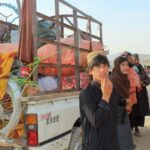The recent outbreak of war and escalating tensions between Iran and Israel mark the beginning of yet another dangerous crisis for the region. Unfortunately, this conflict is not limited to just these two nations—it risks dragging in other countries in the Middle East, affecting the broader Islamic world, and even influencing global strategic dynamics. The continuation and expansion of this conflict will not only result in humanitarian catastrophes but will also have far-reaching impacts on the region’s economy, politics, and social stability. Afghanistan, which has finally begun to breathe a sigh of relief after decades of turmoil, must observe the situation with vigilance, foresight, and national prudence.
The Afghan people have left behind a long and painful history of war, destruction, displacement, and grief. Today, they find themselves at a juncture where every citizen yearns for peace, reconstruction, and progress. For this reason, becoming entangled in a regional conflict that has no direct connection to Afghanistan is not only unnecessary but also highly perilous. We must learn from past experiences that Afghanistan has gained nothing from involvement in proxy wars—no honor, no development, and certainly no benefit for its people.
The dangerous dimensions of the Iran-Israel war—such as the potential spread of proxy conflicts and the ignition of violence in places like Yemen, Lebanon, Syria, and Iraq—pose serious threats to regional countries, especially vulnerable and economically fragile nations like Afghanistan. In such circumstances, the Afghan caretaker government must adopt a stance rooted in neutrality, preservation of stability, and safeguarding national interests.
The only guarantee for protecting the Afghan people is to avoid becoming a pawn in others’ rivalries, proxy battles, and geopolitical blocs. For this, Afghanistan’s foreign policy must be based on the principles of non-alignment and intelligent monitoring. Any action that could be interpreted as support, condemnation, or interference regarding Iran or Israel must be undertaken with thorough political calculation. This responsibility does not lie with the government alone; media outlets, religious scholars, civil society activists, and community leaders also bear the duty to guide public sentiment carefully so that Afghanistan remains distant from these new wars.
On another note, it is equally important for the Afghan caretaker government to maintain relations with international, Islamic, and neighboring countries through cautious diplomacy, and to promote messages of mediation, peace, and mutual understanding. This approach would not only uphold Afghanistan’s dignity but also project the nation as a wise and stability-seeking country.
Domestically, all security, political, and social institutions must realize that any form of recklessness, emotional positioning, or unnecessary partisanship can once again place Afghanistan under the shadow of violence, instability, and international pressure. The Afghan people must urge their government to adopt a firm stance for peace and stability and steer clear of all proxy policies and foreign entanglements.
In conclusion, we must collectively strive to protect the relative peace that has emerged after years of sacrifice, hope, and prayer. This is a time for wisdom, strategic thinking, and national vision. Afghanistan must protect its people and territory by remaining distant from the ongoing regional wars. Every action must be evaluated through the lens of peace, stability, and development—not through emotion or short-term political interests.
Peace is precious—let us preserve it.













